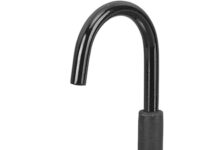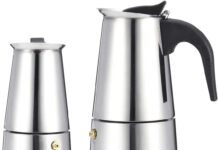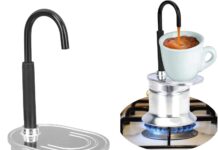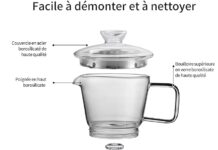There’s nothing quite like starting the day with a rich, aromatic cup of coffee brewed from your trusty Bialetti coffee maker. But what do you do when that first sip reveals a disappointingly bitter taste? Fear not, for we have the answer to this brewing mystery. From exploring the role of heat in coffee extraction to the influence of grind size, we will uncover the reasons behind your bitter Bialetti brew and provide you with simple yet effective solutions to ensure your mornings are filled with delightful caffeine bliss. So grab your coffee mug and let’s embark on a journey to uncover the secrets behind the bitterness in your favorite Italian coffee.
This image is property of lux-haus.net.
Grind Size
Why is grind size important?
Grind size plays a crucial role in the extraction process of coffee brewing. When we talk about grind size, we are referring to the size of the coffee particles after they have been ground. The grind size can significantly impact the overall flavor and taste of the coffee. It determines how quickly the water extracts the coffee’s flavors and aromas during the brewing process.
What is the ideal grind size for Bialetti coffee?
For brewing coffee with a Bialetti coffee maker, a medium-fine grind size is generally recommended. This specific grind size allows for a balanced extraction and helps create a rich and flavorful cup of coffee. It ensures that the water passes through the coffee grounds at an appropriate rate, neither too fast nor too slow.
What happens if the grind size is too fine?
If the grind size is too fine for your Bialetti coffee maker, it can result in over-extraction. Over-extraction occurs when the water takes too long to pass through the coffee grounds, leading to a bitter and unpleasant taste. The fine particles can clog the filter and slow down the brewing process, causing the coffee to become overly bitter and unenjoyable.
What happens if the grind size is too coarse?
On the contrary, using a grind size that is too coarse for your Bialetti coffee maker can result in under-extraction. Under-extraction means that the water passes through the coffee grounds too quickly, resulting in a weak and flavorless cup of coffee. The coarser grounds may cause the water to flow through too fast, leaving behind underdeveloped flavors and a lack of complexity.
Water Temperature
Why is water temperature crucial for coffee brewing?
Water temperature is a critical factor in coffee brewing as it affects the extraction of flavors from the coffee grounds. Different compounds in coffee dissolve at different temperatures. If the water temperature is too hot, it can lead to over-extraction, resulting in a bitter taste. On the other hand, if the water temperature is too cold, the extraction will be insufficient, leading to a weak and underwhelming cup of coffee.
What is the recommended water temperature for Bialetti coffee?
The recommended water temperature for brewing coffee with a Bialetti coffee maker is between 195°F and 205°F (90°C – 96°C). This temperature range allows for optimal extraction, ensuring that the coffee flavors and aromas are adequately extracted without introducing any unwanted bitterness.
What happens if the water temperature is too hot?
When the water temperature is too hot, it can lead to over-extraction of the coffee grounds. This results in a bitter and burnt taste, overshadowing the delicate flavors and aromas of the coffee. The high temperature can also cause the coffee to become unpleasantly acidic, further affecting the overall balance of the brew.
What happens if the water temperature is too cold?
Using water that is too cold when brewing with a Bialetti coffee maker can result in under-extraction. The low temperature prevents the coffee from fully releasing its flavors and aromas, leading to a weak and lackluster cup of coffee. The under-extracted coffee may taste sour or acidic, lacking the depth and complexity that comes with proper extraction.
Coffee-to-Water Ratio
How does the coffee-to-water ratio affect the taste?
The coffee-to-water ratio refers to the proportion of coffee grounds to water used during brewing. It has a significant impact on the taste and strength of the coffee. The ratio determines the concentration of dissolved coffee compounds in the final brew. A higher ratio will yield a stronger and more flavorful cup, while a lower ratio will result in a milder and less intense taste.
What is the ideal coffee-to-water ratio for Bialetti coffee?
The ideal coffee-to-water ratio for brewing coffee with a Bialetti coffee maker is generally considered to be around 1:15 to 1:17. This means using 1 gram of coffee for every 15 to 17 grams of water. However, personal preference may vary, and experimenting with different ratios can help you achieve your desired strength and taste.
What happens if the coffee-to-water ratio is too high?
Using a higher coffee-to-water ratio can result in an intense and stronger cup of coffee. While some coffee lovers prefer a bolder flavor, going too high with the ratio might make the coffee taste overly strong and overpowering. This can lead to an unbalanced brew with increased bitterness and potentially overpowering acidity.
What happens if the coffee-to-water ratio is too low?
Conversely, using a lower coffee-to-water ratio will result in a more diluted and milder cup of coffee. The lack of sufficient coffee grounds can lead to a weak taste with less depth and complexity. The flavors might be overshadowed by a predominance of water, resulting in a less satisfying and underwhelming coffee experience.
Roast Level
How does the roast level impact the flavor of coffee?
The roast level of coffee beans significantly affects the flavor profile of the resulting brew. Different roast levels bring out different characteristics in the beans, ranging from vibrant acidity to rich chocolatey notes. The roast level is determined by the time and temperature during the roasting process and determines the color and oiliness of the beans.
What is the recommended roast level for Bialetti coffee?
For Bialetti coffee, a medium to medium-dark roast level is generally recommended. This roast level strikes a balance between preserving the natural flavors of the coffee beans and developing the richer and more caramelized notes associated with darker roasts. It allows for a flavorful and well-rounded cup of coffee without compromising on complexity.
What happens if the coffee is too darkly roasted?
Using coffee beans that are too darkly roasted can result in a harsh and bitter taste. Dark roasts tend to have a more pronounced bitterness, often accompanied by smoky or burnt flavor notes. The intense roast can overpower the subtle flavors of the coffee, leading to a less enjoyable and imbalanced cup of Bialetti coffee.
What happens if the coffee is too lightly roasted?
If the coffee beans are too lightly roasted, the resulting brew might lack depth and complexity. Light roasts generally have a brighter acidity and retain more of the bean’s natural flavors. However, they may also have a slightly grassy or tea-like taste. This can result in a cup of Bialetti coffee that lacks the desired richness and smoothness associated with a balanced roast.
This image is property of cdn.shopify.com.
Brewing Time
Why is the brewing time important for Bialetti coffee?
The brewing time plays a vital role in the overall extraction process and ultimately affects the flavor and strength of the coffee. It refers to the amount of time the water and coffee grounds are in contact during the brewing process. The duration determines how much flavor, aroma, and compounds are extracted from the coffee grounds, leading to a well-rounded and balanced cup of Bialetti coffee.
What is the optimal brewing time for Bialetti coffee?
The optimal brewing time for Bialetti coffee is typically around 4 to 5 minutes. This duration allows for the extraction of the desired flavors and aromas from the coffee grounds without over-extracting and introducing unwanted bitterness. However, it’s important to note that brewing time can vary depending on personal preference, grind size, and other factors.
What happens if the brewing time is too short?
If the brewing time is too short, it can result in under-extraction. Insufficient contact time between the water and coffee grounds leads to a weak and underdeveloped cup of coffee. The flavors may be muted, and the overall taste might lack depth and complexity. Shorter brewing times can result in a lackluster experience, leaving coffee lovers craving for a more satisfying brew.
What happens if the brewing time is too long?
Conversely, if the brewing time is too long, it can lead to over-extraction. Prolonged contact between the water and coffee grounds can extract an excessive amount of compounds, resulting in a bitter and unpleasant taste. The over-extracted flavors can overwhelm the desirable characteristics of the coffee, resulting in a potentially bitter and unbalanced cup of Bialetti coffee.
Water Quality
How does water quality affect the taste of Bialetti coffee?
The quality of water used in brewing Bialetti coffee can significantly influence the taste of the final brew. Water makes up the majority of the coffee beverage, and its composition can affect everything from the extraction process to the clarity of flavors. The minerals, pH level, and overall purity of the water play a vital role in enhancing or detracting from the quality of the coffee.
What are the recommended water specifications for brewing Bialetti coffee?
Ideally, the water used for brewing Bialetti coffee should be clean, fresh-tasting, and free from strong odors. When it comes to minerals, a moderate mineral content is desirable, as it contributes to the extraction process and enhances flavors. The optimal pH range for brewing coffee is typically between 6.5 and 7.5, slightly on the acidic side.
What happens if the water used is hard or has impurities?
If the water used in the Bialetti coffee maker is hard or contains impurities, it can affect the taste and quality of the coffee. Hard water, which contains high mineral content, can lead to an over-extracted and harsh taste. Impurities such as chlorine or other chemicals can introduce off-flavors and alter the taste profile of the coffee, leaving an unpleasant and unwanted taste.
What happens if the water used is distilled or overly soft?
Using distilled or overly soft water can also impact the taste of Bialetti coffee. Distilled water lacks minerals essential for the extraction process, resulting in an under-extracted and weak cup of coffee. Similarly, overly soft water can hinder the extraction and result in a flat and dull coffee taste. Striking a balance with moderate mineral content helps achieve a more desirable and flavorful brew.
This image is property of twochimpscoffee.com.
Storing Coffee
How does coffee storage impact the flavor of Bialetti coffee?
Proper coffee storage is crucial for maintaining the freshness and flavor of Bialetti coffee. Coffee beans are vulnerable to various factors such as moisture, air, heat, and light, which can accelerate the degradation process. By storing coffee correctly, we can extend its shelf life and preserve the flavors and aromas, ensuring an enjoyable cup of coffee every time.
What are the best storage practices for maintaining coffee freshness?
To maintain the freshness of Bialetti coffee, it is recommended to store the coffee beans in an airtight container, away from light, heat, and moisture. Ideally, the container should be opaque or kept in a dark and cool place, such as a pantry or cupboard. It is also crucial to keep the coffee away from strong odors, as coffee can absorb and be influenced by surrounding scents.
What happens if the coffee is stored improperly?
Improper storage can lead to coffee losing its freshness and developing stale flavors. Exposure to air, heat, and light can cause oxidation and break down the complex compounds that contribute to the coffee’s taste and aroma. Storing coffee in a humid environment can lead to moisture absorption, resulting in a loss of flavor and potential mold growth. Improperly stored coffee may taste flat, dull, and lacking in complexity.
What happens if the coffee is exposed to moisture or air?
Exposure to moisture and air can have detrimental effects on the flavor of Bialetti coffee. Moisture, whether from high humidity or improper storage, can cause the coffee beans to deteriorate and lose their freshness. It can lead to the growth of mold and spoilage, resulting in an unpleasant taste and potential health risks. Air exposure can cause oxidation, which rapidly degrades the flavor compounds in the coffee, resulting in a stale and undesirable cup.
Cleaning the Bialetti
Why is cleaning the Bialetti important for coffee taste?
Regular cleaning of the Bialetti coffee maker is essential for maintaining the taste and quality of the coffee. Over time, coffee residue and oils can accumulate in the different parts of the coffee maker, impacting the flavors of future brews. Cleaning helps prevent the buildup of rancid oils and residue, ensuring a fresh and uncontaminated coffee taste every time.
What are the recommended cleaning techniques for Bialetti coffee makers?
To clean a Bialetti coffee maker, disassemble the components, including the upper chamber, funnel, and gasket, and wash them with warm soapy water. Ensure thorough cleaning and rinse off any soap residue. To remove any stubborn coffee stains or residue, you can use a non-abrasive brush or cloth. It is also important to clean the Bialetti regularly and avoid leaving unused coffee residues in the coffee maker.
What happens if the Bialetti is not cleaned regularly?
If the Bialetti coffee maker is not cleaned regularly, coffee oils can accumulate and turn rancid over time, imparting an off-flavor and aroma to subsequent brews. The accumulated residue can also clog the brewing mechanism, affecting the extraction process and potentially leading to uneven or incomplete extraction. Regular cleaning is crucial to maintain the integrity and taste of Bialetti coffee.
What happens if leftover coffee residues accumulate?
If leftover coffee residues accumulate in the Bialetti coffee maker, it can lead to a stale and unpleasant taste in subsequent brews. The accumulated residues can become rancid and impart off-flavors to the coffee, overshadowing the desired flavors and aromas. Additionally, these residues can clog the brewing mechanism, affecting the flow of water and extraction efficiency, resulting in a compromised cup of Bialetti coffee.
This image is property of i.ytimg.com.
Quality of Coffee Beans
How does the quality of coffee beans affect the taste of Bialetti coffee?
The quality of coffee beans plays a fundamental role in the overall taste and flavor profile of Bialetti coffee. Higher-quality beans tend to have more desirable and complex flavors, as well as a well-rounded balance of acidity, sweetness, and bitterness. Selecting and using high-quality coffee beans can significantly enhance the taste and overall experience of Bialetti coffee brewing.
What are the characteristics of high-quality coffee beans?
High-quality coffee beans are typically grown under optimal conditions in regions known for producing excellent coffees. They are often hand-picked when fully ripe, ensuring that only the finest cherries make it into the final product. High-quality beans exhibit a range of flavors and aromas, which can vary depending on the origin, cultivar, and processing methods. They are generally free from defects and have a well-balanced and pleasant taste.
What happens if low-quality or stale coffee beans are used?
Using low-quality or stale coffee beans can result in a lackluster and disappointing cup of Bialetti coffee. Low-quality beans may exhibit off-flavors, lack complexity, and have an overall unbalanced taste profile. Stale beans lose their natural flavors and aromas, leading to a flat and dull cup of coffee. It is crucial to invest in high-quality, freshly roasted beans to ensure the best possible taste and coffee experience.
What happens if the coffee beans are ground too far in advance?
If coffee beans are ground too far in advance, they can quickly lose their flavors and aromas. The act of grinding exposes the coffee to increased surface area, making it more susceptible to oxidation and flavor degradation. Pre-ground coffee can quickly become stale, resulting in a less vibrant and satisfying cup. To preserve the freshness and quality of Bialetti coffee, it is recommended to grind the beans just before brewing.
Other Factors
Are there any other factors that can contribute to bitter-tasting Bialetti coffee?
Yes, there are additional factors that can contribute to bitter-tasting Bialetti coffee. One common factor is over-extraction, which can occur when the brewing time is too long or when the grind size is too fine. Over-extraction extracts an excessive amount of bitter compounds from the coffee, resulting in an imbalanced and overly bitter taste. It is also important to consider the freshness of the coffee beans and the cleanliness of the brewing equipment.
How can the brewing process be adjusted to mitigate bitterness?
To mitigate bitterness in Bialetti coffee, several adjustments can be made. Firstly, consider using a coarser grind size to reduce the surface area and slow down the extraction process, ensuring a smoother cup. Adjusting the coffee-to-water ratio by using less coffee or increasing the water amount can also help balance the flavors. Additionally, reducing the brewing time and using a moderate water temperature can contribute to a less bitter taste.
What are some common mistakes to avoid when brewing Bialetti coffee?
When brewing Bialetti coffee, there are a few common mistakes to avoid. These include using water that is too hot or too cold, using an incorrect grind size, over-extracting the coffee by brewing for too long, using stale or low-quality coffee beans, and neglecting to clean the Bialetti coffee maker regularly. Being mindful of these factors and making adjustments accordingly can significantly improve the taste and quality of the brewed coffee.
Are there any alternative brewing methods for less bitter coffee?
Yes, there are alternative brewing methods that can yield less bitter coffee. Some popular options include pour-over methods like the V60 or Chemex, which provide more control over the brewing variables. Cold brew, steeping coffee grounds in cold water overnight, can also produce a smoother and less bitter cup. Each brewing method has its unique characteristics, and exploring different methods can help coffee lovers find the ideal flavor profile that suits their preferences.
This image is property of twochimpscoffee.com.










































